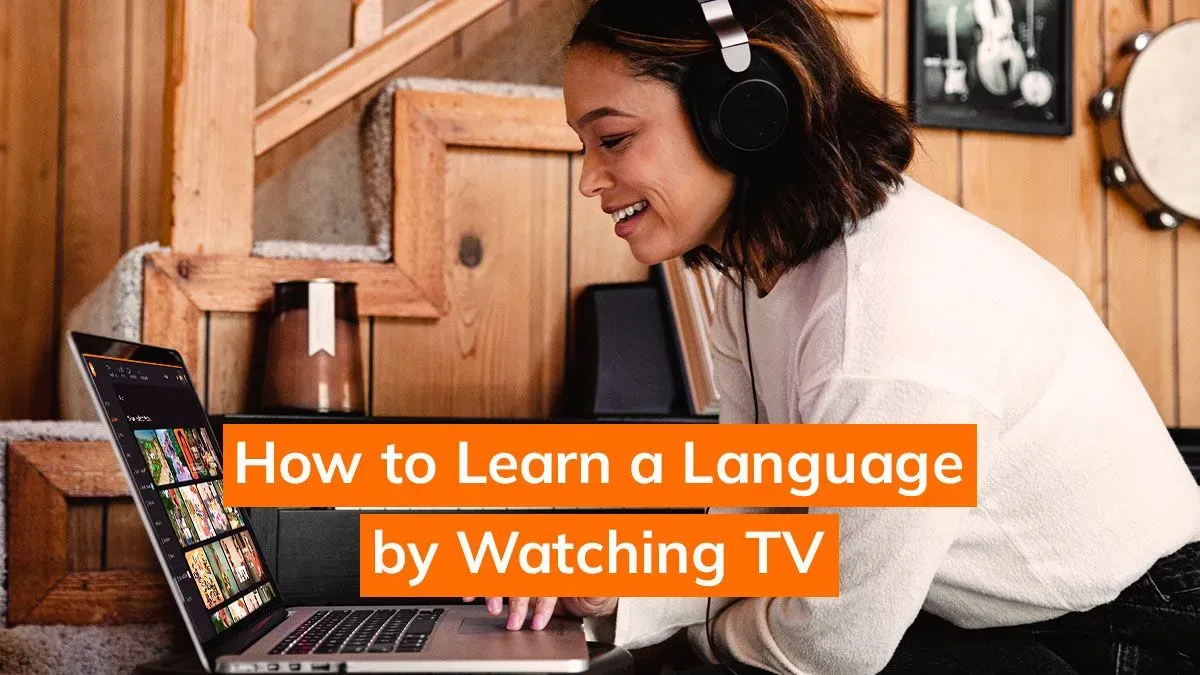You might be asking yourself "can I really learn English with TV series and videos?" Well, the answer is yes! You can!
In this guide to learning English with TV, we will first explain why TV shows and videos are your best friends when it comes to language learning, and then we will break down 10 methods for learning English with TV.
By the end of this guide, you should have a good idea of how to learn English with tv series and videos, where to find interesting shows, and what to watch.
Let's dive right in!

How Watching TV Can Teach You English
Watching English-language TV shows and videos, such as social media content, provides natural exposure to English as spoken by native speakers.
This is a valuable way to develop your understanding of the language, sentence structure, useful phrases, colloquialisms, and pronunciation.
Hearing English natives talk allows you to learn grammar rules organically, which is a much more natural way to learn than studying the rules in isolation.
The brain absorbs information like an infant learning its mother tongue, through immersion and exposure. You do not need to be actively studying all the time to take in new information.
Learning a new language with your favorite TV show is much more fun than sitting through language classes and pouring over textbooks for hours.
Related:


Some language learning platforms, such as Lingopie, focus learning around watching TV series and movies in a target language. This is because it is a proven way to learn organically.
Now, let's break down the different methods you can employ to optimize your learning while you binge your favorite shows.
10 Methods for Learning English by Watching TV
Using a combination of these methods will ensure that you develop all of your language skills: reading, writing, listening, and speaking.
1. Use English Subtitles
Most English-language content on streaming services will offer English subtitles, as well as subtitles in your own language. Some platforms, like Lingopie, offer dual subtitles in your native language and English simultaneously.
Moreover, it is now common on social media platforms to add captions to videos for accessibility. So, it should not be hard to find engaging TV shows and videos in English with subtitles.
If you are a beginner or lower-intermediate learner, you might prefer to begin watching English TV series with subtitles in your native language - and this is okay!
However, once you get more confident, switching to English will optimize your learning. Try re-watching a show with English subtitles once you have watched it with subtitles in your first language.
Reading subtitles can help you to associate sounds with spelling and it can make content more accessible.
Visual learners can benefit from being able to see the words as they are spoken, and in general, all learners can follow dialogue more easily if they can read along with it.
Related:

2. Stop and Replay Sections

When you encounter a section of dialogue that you cannot make out, pause and replay it a few times, reading the subtitles to help you decipher the words.
All native speakers of English will have different accents, dialects, and tones of voice, and naturally, you will find some harder to comprehend than others. That is normal!
Often, if you pause and take the time to replay a section, the words will become clearer. Take your time and be patient with yourself.
3. Repeat Phrases Out Loud
When you hear interesting new words or expressions in a TV show, you can pause and repeat them aloud. Mimic how the actor says the words to improve your pronunciation.
This is an example of verbal learning. Some people take in information much more easily when they speak it aloud.
Saying a new word aloud repeatedly focuses your learning and moves it from your short-term memory storage to your long-term memory.
You can also record or video yourself speaking English aloud and listen back to assess your fluency and pronunciation. This technique will benefit your speaking skills.
4. Watch at a Slower Speed
Another way to make the videos and shows more accessible is to watch them at a slower speed. Netflix and Lingopie offer various playback speeds, so you can listen at a pace that suits your level.
Watching a show at a slower speed can improve your listening skills as you will focus on each word, rather than being overwhelmed by the rush of noise and missing large chunks of dialogue.
Listening comprehension is one of the more challenging language skills, so be patient with yourself, do not be disheartened if you need to slow the playback speed, and give yourself the time you need to build this vital skill.
5. Write Down Useful Words and Expressions
While you are watching videos and TV, you will come across new expressions, slang, and idioms that interest you. When this happens, rather than forgetting them, write them down.
Learning idioms in another language can be confusing but very entertaining and rewarding once you've cracked the meaning.
You can compile a list of fun new phrases, or make flashcards of interesting English vocabulary. If you revise these flashcards at regular intervals, you will retain the information and deepen your grasp of the language.
If you are more of an auditory learner, another top tip is to record yourself saying the vocabulary out loud. Then, while you walk or do household chores, listen to the recording and allow the phrases to sink into your long-term memory.
Keep records of your voice notes and vocab lists. This can become your very own little dictionary of useful English words and phrases.
6. Visualization and Association

A great way to remember important information is to employ visualization techniques. When you read the word or phrase that you are trying to learn, visualize the scene in the show in which the language was used.
Take your vocab list or flashcards and run through all of the new sayings you have noted down. Associate each one with an image, such as the character's face, the backdrop of the scene or a key prop in the scene. Anything that you can strongly associate with the words.
Once you have run through all of the vocab a couple of times, it should be much easier to absorb the meaning and appropriate context for the words and phrases, as your brain will conjure the image of the scene in which it was used in context.
7. Try to Use New Vocabulary in Real Life
Once you have noted down some useful new sayings, you can make an effort to use them in the right context in a real-life scenario.
This is easiest if you are visiting an English-speaking country. However, there are other ways to get speaking practice. For instance, you can find a language exchange partner online or join an English class.
Using new vocab in real-life situations is a great way to solidify the learning and ensure that you do not forget the phrases. Moreover, it ensures that you can use them in the appropriate context.
This is an awesome way to work on your speaking skills and build confidence using English in day-to-day life.
8. Write Sentences with New Words
Similar to using the new vocabulary in real-life dialogues, you can also practice using new words and phrases in writing.
Especially when you need to reinforce the meaning of an expression, it can help to see it in context. For instance, if you have just learned the idiom "he has a frog in his throat", you could write "the man's voice is raspy because he has a cold. He has a frog in his throat."
Try writing a sentence for every idiom and you will find that the language becomes much more accessible.
This is a very useful learning task that helps you to remember new sayings but also puts them in an appropriate context, so you reinforce their meaning.
9. Write a Plot Summary in English
By writing a brief summary of the plot of the episode you have just watched, you can reinforce your learning.
Not only will this prove that you have a good general understanding of the content of the show, but it will also remind you of the new language you have picked up.
When writing your plot summary - in English, of course - you should incorporate the new vocabulary you have learned into the summary.
Write as if you are telling someone who has never seen the show what happened. This will remind you to be detailed and use full sentences to explain the story.
A pro tip for writing detailed, full sentences is to use "because". Do not stop at "it was a funny episode" or "the character was angry", always add the reason why.
10. Watch a Second Time Without Subtitles
Finally, if you have been watching shows and videos with subtitles in your own language, this is the time to revisit them and try watching only with English subtitles.
And if you have been watching with English subtitles, try rewatching without any at all!
Now that you have worked through all the above methods for language learning for an episode of a show, you should have a strong understanding of the language used in that episode.
So, try repeating it without subtitles to test your learning. Remember, you can watch on a slower playback and repeat any sections you need to hear again.
Where to Watch English-Language TV and Videos
There are several platforms where you can find engaging and interesting shows and videos in English. For short and accessible videos, check out YouTube, or social media sites like TikTok and Instagram.
TikTok is full of educational, entertaining short videos that often have closed captions for accessibility. Instagram has a "reels" page which works in much the same way as TikTok. Both sites boast endless short and snappy videos optimal for quick learning.
If watching movies and series with several seasons is more your speed, then visit Netflix. With different playback speed options, subtitles, and a huge catalog of content, this platform is a great language-learning resource.
Moreover, Lingopie offers movies and series in English that all come with a series of great interactive features for language learning. Each show comes with a full interactive transcript, interactive subtitles, the option to make flashcards with new words, and different playback speeds.
On Lingopie, you can also complete short quizzes based on the vocabulary you have saved. These features reinforce your learning and motivate you to turn up to learn every day.
Choosing Which TV Series or Videos to Watch
Now it is time to choose which shows and videos you want to watch. It is recommended that you select content appropriate for your English level. This will provide you with an optimized learning experience.
For instance, watching children's shows when you are an upper-intermediate or advanced learner might not be challenging enough to be worthwhile from a learning point of view. Likewise, watching a complex scientific documentary as a beginner might be overwhelming.
Think about the type of language you would like to learn, be it day-to-day vocab, business English, nature-related, and so on. Then, choose a show that features this language prominently.
To practice listening to British accents, watch a British show, and to practice listening to American accents, watch an American show. Remember, there is some vocab that is specific to either British or American English.
If you get overwhelmed by whole TV shows or movies in English, try watching a short video every day instead.
Some Recommendations
There is no shortage of great TV in English, but if you don't know where to start, here are some awesome recommendations to get the ball rolling on your language-learning journey.
First, 20-minute sitcoms like the cc, Friends, and Modern Family are accessible small bites of high-quality English TV. These shows use a lot of useful day-to-day vocab and they offer a good insight into American culture.
If you prefer to sink your teeth into longer episodes with more drama, action, and thicker plots, check out the Walking Dead or Law & Order. The former is a post-apocalyptic horror show, while the latter is a drama about the American justice system.
For a look at British culture, try Skins. This is a dark comedy that depicts the lives of English teenagers in the 2000s. The show deals with challenging topics like mental ill health, adolescent sexuality, bullying, and drug use.
Finally, for some light-hearted entertainment, you can get into Hell's Kitchen. This is a reality show about the famous chef Gordon Ramsay. Tempers can run high as chefs compete for a top job.
For more recommendations, reach out to your English-speaking friends to see what is popular right now. The options are endless!
Don forget that Lingopie contains a variety of amazing Tv shows, including your Netflix Favorites.


FAQs: Learning English with TV Series and Videos
How does watching TV in English improve listening skills?
Watching an English TV show is like giving yourself a mini listening test. You expose yourself to native English speakers and work on your listening comprehension. This is a fun and engaging way to challenge your listening skills, as you can enjoy the show while you focus and build your skills.
Can I become fluent just by watching TV series and videos in English?
You can certainly improve your language acquisition by watching English TV shows and videos. For the most optimal learning experience, you should also incorporate other methods, such as reading, listening to music, speaking with a native, and even taking classes to learn English.
Which shows should I watch for Business English?
The Office (watch the American version to practice comprehending American accents and the British version for British accent comprehension). This series follows the format of a documentary, except it is actually scripted. It feels like you are watching people in a real office live their daily lives, so it's a great pick for normal, practical vocabulary acquisition.
Should I watch English tv every day?
Watching English shows or videos every day will absolutely help you to learn English with more fluency! If you can take even half an hour every day to immerse yourself in an English TV show, you will significantly speed up your language acquisition.

Summing Up: How to Learn English with TV Shows and Videos
Hopefully, this comprehensive guide for learning English by watching TV shows and videos has inspired you to start binge-watching awesome English-language content.
Listening to native speakers will allow you to absorb the language and grammar naturally to develop your English skills and vocabulary, all while having fun.
Using a combination of our 10 methods for learning English with TV will optimize your learning. Try to incorporate reading, writing, listening, and speaking practice into your watching.Visit TikTok and Instagram for engaging short videos in English, or Netflix and Lingopie for TV series and movies. Remember, Lingopie's language learning features are there to help you progress.







![Improve Your English Listening Comprehension [2025 Guide]](/blog/content/images/size/w300/2023/12/5D8A320F-7EF3-4F0F-9EDD-0F91C9504FA0.png)
![4 Hacks to Learn English With Movies [2025 Guide]](/blog/content/images/size/w300/2023/10/88AAD01A-8BF3-4648-82CC-639C1B240C28.png)

![How To Learn English With Sitcoms: 5 Easy Ways [Guide]](/blog/content/images/size/w300/2023/09/94E050B7-BD8B-4659-B6E5-B5996E461FC8.png)